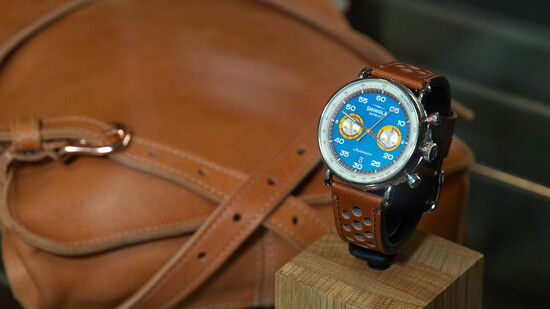If you've heard of Shinola, you might know a few things: Detroit. Watches. Leather. Possibly even that former president Barack Obama toured the Detroit factory.
But you might not know how deep the story goes—or how wide.
So if you’re expecting this story to be merely about precision timepieces and American grit, get ready to be surprised. The picture Shinola’s chief marketing officer Kevin Wertz paints for me is something bigger and better.
“You don’t just wear a watch,” Kevin says. “You wear a story.”
Shinola’s story is remarkable: legions of devoted fans don’t just buy their watches—they also make the brand part of their lifestyle. "We wanted to be the American watchmaker, sure,” Kevin admits. “But we also make turntables. Leather bags. A hotel that might be the most beautiful in Detroit. You get to tell a different story in different categories, but the core of the story is the same.”
I ask what the core of the story is, and Kevin doesn’t hesitate: Shinola is an American brand for people who don’t want to advertise their wealth.
"We don't scream luxury,” Kevin notes. “We don't need to. Our watches are worn by people who could buy anything, but choose Shinola. And we’re not trend-driven. We’re not fast fashion. That’s what makes us feel timeless,” Kevin says. “We stay true to who we are.”
Who Shinola is is something once common, now all too rare: long-lasting, American-made quality. The leather bags? Designed to look better with age, to develop a patina customers treasure. The watches? Tested more rigorously than many Swiss brands. And they’re assembled in Detroit by workers Shinola carefully trained.
"We literally re-skilled workers," Kevin explains. "We’ve been teaching people to assemble watch movements and sew leather straps—for over a decade.”
Obama isn’t the only former president who wears Shinola: so does Bill Clinton. Legendary comedian Jerry Seinfeld sports one too. Even the owner of the reigning Super Bowl champion Philadelphia Eagles lifted the Lombardi Trophy while wearing a Shinola watch.
But celebrity isn't the goal, Kevin tells me; it's a byproduct: "We're not courting fame,” he notes. “We're building culture. Quietly."
Their timepiece commemorating hip-hop legend and Detroit native J Dilla proved that. They made just 650 watches total. They sold out before the public launch. And now? They're selling for a premium on eBay.
"That was a moment," Kevin says. "It's not just a product drop. It's cultural cachet. And when those moments string together—the hotel, the turntable, the Dilla collab—you start to form a different kind of relationship with the brand."
I ask Kevin: what celebrity figures from the past he could see being a fan of Shinola. He offers a name that couldn’t be more fitting. “Henry Ford. What he did for manufacturing, for American jobs…I think he’d appreciate what we’re doing here.”
It tracks—Shinola keeps drawing names tied to legacy, intention, craft. And in that spirit, Kevin tells me about the watch he wears: The Mechanic, a fully analog, hand-wound piece.
“There’s no battery. No automation. If you don’t wind it, it doesn’t work,” he says. “It’s a relationship.”
A relationship. That’s the essence of life as human beings. And while every brand wants one with its customers, few actually earn it. Shinola, it seems, does.
As the conversation winds down, I ask what Kevin hopes people always associate with the name Shinola.
The answer comes quickly: “American manufacturing,” he says. Then he adds, “And quality. People recognize the quality—and that builds a bond.”
A bond. A relationship. That’s where Shinola seems to live: in the quiet trust between maker and wearer.
Because in the end, relationships aren’t just about keeping time. They’re about spending time together.
To feel what it's like to wear a story, visit shinola.com
